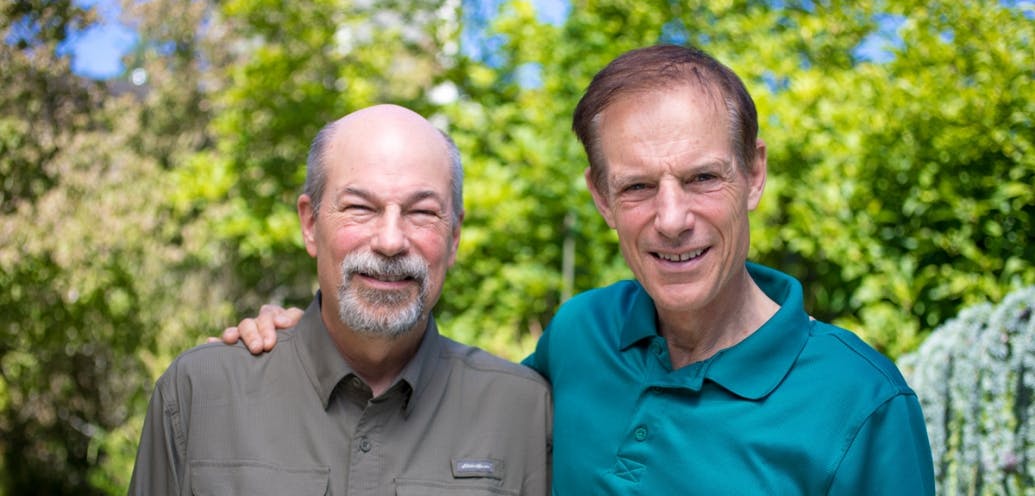On April 21, 2015, former Seattle Pacific University business school dean Alec Hill ’75 was diagnosed with myelodysplasia, a rare and aggressive cancer of the bone marrow. In May, a second opinion concurred. He was going down fast.
Without a risky bone marrow transplant, the 62-year-old president of InterVarsity Christian Fellowship would be dead within 18 months.
Alec and his wife, Mary, went home and wept.
Cancer, again. In 2011, he had successfully beaten glandular cancer following seven hours of surgery.
But this year he faced a life and death struggle with a new and unrelated cancer, a struggle he likened to being on a very slow train. After 14 years of fast-paced travel and speaking for InterVarsity, an international Christian ministry to college students and faculty with an annual budget of $100 million, “everything stopped.”
Alec recalls the shock upon hearing the diagnosis. “We gave away a lot of my stuff to InterVarsity staff — my golf clubs, my suits,” remembers Alec. “Still, I felt surrounded by God’s presence. I had lived a rich life; I was prepared to die.” The Hills moved to a condo in the Seattle area, then took up residence for four months at Seattle Cancer Care Alliance.
Family members were blood-tested for suitability as bone marrow donors. Among them was Alec’s brother and fellow Seattle Pacific 1975 graduate, Grant Hill. It was a long shot, a 25 percent chance of him being an identical match. There are not many 63-year-old marrow donors, since older donors produce stem cells at lower rates and often can’t donate enough.
The tests showed Grant was a perfect match. “The only thing that counted right then was genetics,” says Alec, his next words tinged with awe. “Grant had the right stuff.”
Each brother had his own set of doctors. Between Alec and any hope of healing lay a grueling path. For five days, he was subjected to intense chemotherapy treatments and full-body radiation. At the end, says the 2012 SPU Alumnus of the Year and 1988 Professor of the Year, “I was bleached completely white, all my white cells killed.” On what the physicians call Day Zero, healthy white cells from Grant’s body were transplanted into Alec’s body intravenously. What followed was what Alec calls “a zombie-like existence,” waiting to see if the healthy cells would take. He lost 20 pounds and swallowed 50 pills a day to maintain his artificial immune system. A catheter for drawing blood was installed in his chest.
“My job in donating was so much easier than what he went through,” says Grant, who is currently a professor in the department of kinesiology at Long Beach State University.
On Day 24, Alec’s body started again producing healthy white cells. The transplant had taken.
The year ahead was one of recovery in isolation — no church, no restaurants, no public places where his weakened condition could be compromised by human germs. A common cold could kill him. He avoided dogs, insects, and flowers.
Though myelodysplasia would never return, he had become more susceptible to melanoma and other cancers. The sun was now the greatest risk; hats and long sleeves would be mandatory any time he stepped outdoors. Finally, on August 18, 2016, doctors declared that his cancer was gone and immediately liberated him from home quarantine.
He and Mary, a 2002 SPU MBA graduate who had been his nurse, counselor, confidante, and protector, took in two Mariners baseball games, about as public a venue as they could find. “In vintage Mariners fashion,” Alec reported to his close supporters, “we won the first easily and then lost the second by giving up four runs in the ninth. Welcome back to normalcy!” It was a fitting celebration of a 40-year marriage and a new lease on life.
This July, Alec and Mary went camping and hiking on the Olympic Peninsula. “Every day I say, ‘This is a bonus day,’” marvels Alec. “I went from survivor’s guilt — ‘Why did I survive when others don’t?’ to survivor stewardship — ‘How can I make each day count?’”
Alec now serves as InterVarsity’s president emeritus. He mentors rising leaders, consults, and works to build the organization’s network.
Counting his blessings has led to practical actions, including volunteering to be a cancer patient mentor, remaining on the board at Christianity Today, and teaching business ethics at Regent College beginning in January 2018.
He says his priorities have changed since his treatment. “The future is less important than the present,” says a more philosophical Alec. “My attention to relationships has gone up while the importance of personal achievement has gone down. I’m less diplomatic and more direct when I speak. Sometimes I go for a walk and just laugh from sheer joy.”
The family’s joy is sometimes made complete through gentle wisecracks. “Are you my dad or my uncle?” jokes daughter Carolyn. Alec muses in a blog post, “Now that his marrow is in me, will I suddenly begin to imitate Grant’s love of dancing (I’m a horrible dancer) or will I share Grant’s disdain for chocolate (perish the thought)?”
What Alec will do is forever carry two sets of DNA inside his body — his own and Grant’s — a physical state known in medicine as chimerism. His blood type even changed.
“Now we are truly blood brothers,” says Grant, who served SPU from 1989 to 2001, including six years as chair of the Department of Exercise Science and Physical Education.
“I never saw the transplant as me having to do my duty, but rather as an opportunity. Watching Alec’s progress now makes me ask, ‘What is the best use of my time?’”
He grows quiet for a moment and watches his brother. “God could have just healed Alec, of course,” he says, “but he allows us to help each other. It’s beyond words.”
For Alec, this is sibling rivalry at its best. And judging by the Hills’ renewed appreciation for brotherhood, the feeling is mutual.




